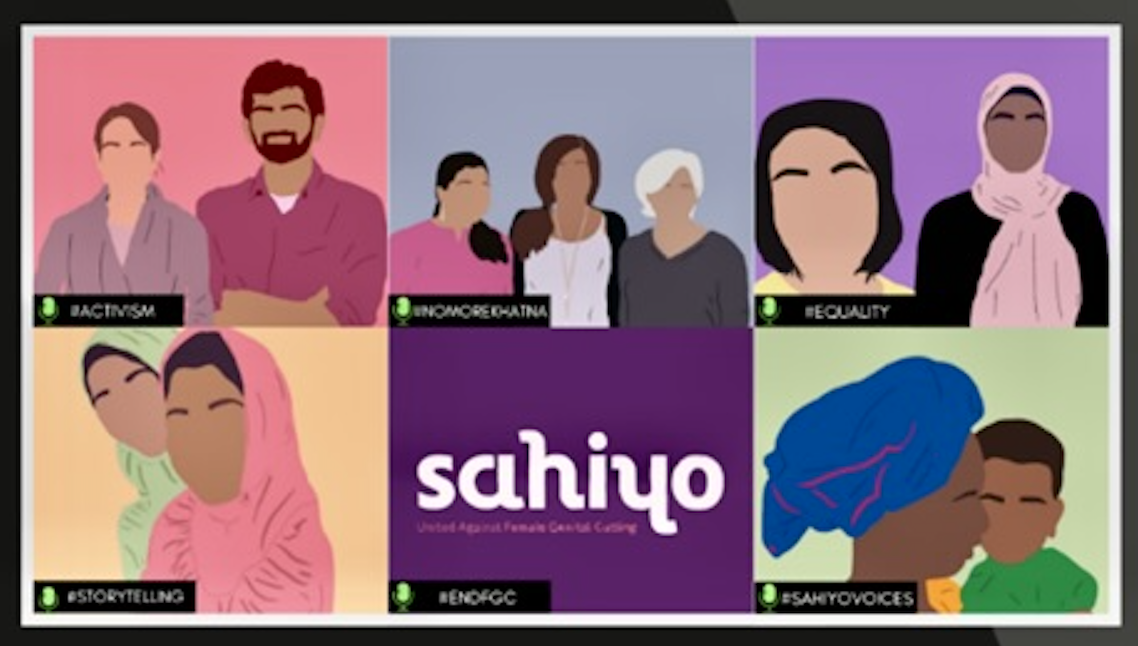By Umme Kulsoom Arif
When I was first invited to join the 2022 Sahiyo Activists Retreat I was… terrified. I almost didn’t sign up. I wanted to be an activist and I wanted to do more with Sahiyo, but I was scared of both..
Being both non-binary and a survivor of FGM/C, I always thought of myself as being in limbo — did my identity as a non-binary individual somehow invalidate the pain of my cutting? Was I less valid within the LGBTQIA+ community because of the trauma I had endured that shaped the way I viewed my gender and sexuality? Was I less valid within the Sahiyo community because I was only perceived by others to be a woman, as opposed to actually feeling like one myself? What did gender and sexuality even mean in the context of being a survivor, an activist, a Dawoodi Bohra, both in the closet and outside of it?
I was scared.
Every step of signing up — from filling out the interest form to creating my bio to sending my first message in the groupchat — was something I procrastinated, almost dreaded doing, because it cemented the feeling of walking into a den of lions. I wondered if I would be judged as harshly as I feel I am by the Bohra community I know, by my extended family, by myself.
I don’t know what compelled me to take every step, but I’m glad that I did. The moment I logged onto that Zoom call and faced the community waiting for me, I realized: this was what being safe truly felt like. I sat, listened, and heard my thoughts, fears, and emotions echoed back to me in the voices of those who — like me — had either gone through or knew someone who had endured an injustice the likes of which I still struggle to properly name.
Grief is a strange, frustrating thing. I never know what to grieve — does one mourn the moment one learns about the loss or the moment of the loss? Do I mourn the teenager tentatively coming out to their mother, and learning suddenly just how little their family valued their autonomy over the words of a man they had never met, or do I mourn the frightened five year old girl-who-one-day-would-not-be, laying on a cold metal table and feeling gloved hand wipe away her tears in an operating room? Or is it both, embracing all that fear, anger, and agony that comes from not knowing and needing to know at the same time?
Even before the Retreat, I had been grieving. I went to therapy, I laid in bed and wallowed in my depression; I bargained with a God I almost didn’t believe in anymore for a justice that did not come; I denied the magnitude of what had been done to me, insisting that others had it so much worse and that I needed to just move on; I accepted the things I could not change and resolved to use my law degree to help others just like me; and… I raged. Quietly, internally, I burned with fury I could not share. As an activist, I knew I had to take a measured response because those who were for FGM/C would use anything, including the tone of activists, to decry and deny the validity of the campaign. But pain is not measured, it is not reasonable; it is a cruel, burning thing, and I found myself repeatedly wondering if I was even ready to do this activism thing if I couldn’t control my emotions.
I felt like a bad person for being angry until the Retreat, until I heard the same emotions in the voices of others and realized the bottled up and tamped down anger was not an aberration, but a reasonable response. While it needed to be edited and pared down and softened to be shared with the world at large, it could be shared here, amongst others who knew the truth. It can feel isolating and infuriating to go against the grain of one’s own community, to be ostracized and judged and feel betrayed by one’s own family to the point where one loses faith. I felt alone, until I didn’t, until I realized there were others who felt as alone as I did. Which is a weird thing to feel, I think.
What the Retreat offered me was a confirmation that I was not alone or an aberration, and that I was enough simply for wanting to speak up and speak about my story. I made friends. I was invited to speak about my identity as a non-binary survivor — which in itself was terrifying, but I did it and found myself feeling even more validated through that experience — and realized both the value of having a global community of people with whom I could be my most authentic (and slightly odd) self and of forgiving myself for the things I could not do in that moment.
Read the report on this year's Activists Retreat.

